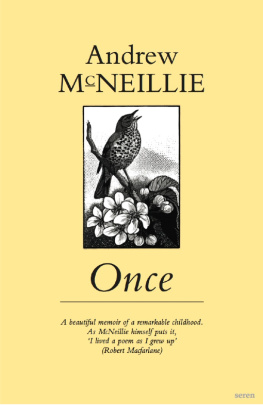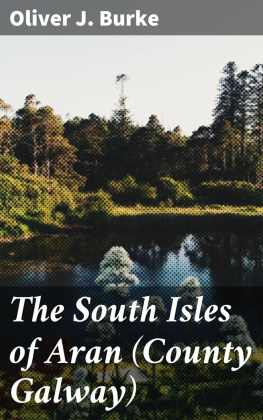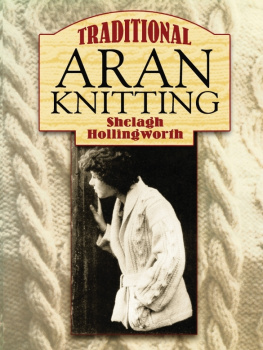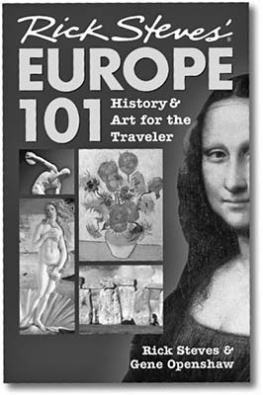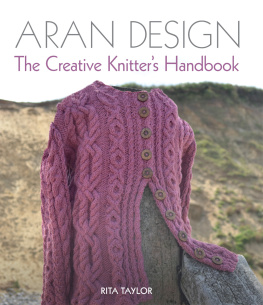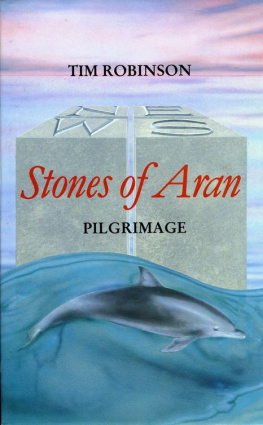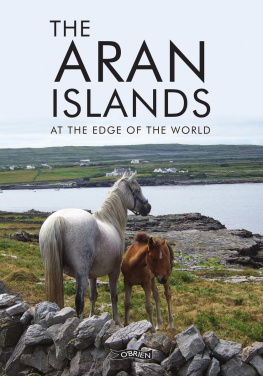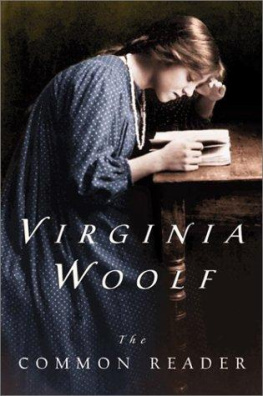All rights reserved. No part of this publication may be reproduced in any form or by any means without the prior permission of the publisher.
First published 2002 by
The Lilliput Press
6263 Sitric Road,
Arbour Hill
Dublin 7, Ireland
www.lilliputpress.ie
This digital edition published 2013 by The Lilliput Press
Copyright Andrew McNeillie 2001
ISBN print edition 1 901866 80 7
ISBN eBook 978 1 84351 464 0
A CIP record for this title is available from The British Library.
The Lilliput Press receives financial assistance from
An Chomhairle Ealaion / The Arts Council of Ireland

An Aran Keening
andrew m c neillie
the lilliput press
dublin
For Diana, Gail and James
Only that which aspires to a caoin , an edge like it
Like a melody tends to the infinite.
In Memoriam: Liam Mac Ille Iosa
hugh macdiarmid
Tis true, I sometimes made a shift to catch a rabbit.
A Voyage to the Country of the Houyhnhnms
jonathan swift
Acknowledgments
This story was finally written up for my children, as a warning shot, as they passed through their adolescence. I want to thank them for encouraging me to polish it up and polish it off. Others have encouraged me too, and they know well who they are, home and abroad. But the clearest debt I owe in seeing this book into print must go to Terence Brown, who first saw it had the makings, and next to Antony Farrell, publisher extraordinaire, and then to my compatriot Jonathan Williams. My editor Brendan Barrington tamed all wilfulness from my pen with the lightest of touches and sharpest of minds, and Im much beholden to him.
Two of the poems here were previously published: They so rarely reach here now as Greylags in Brangle , and Riddle as Corncrake, by the Sycamore Press; both appear in Nevermore (Carcanet, 2000).
Preface
This story, this elegy and adventure, is an invention, a remembering of my stay on Inishmore from November 1968 to the early autumn of the following year. That was seventy years after the Irish playwright and poet J.M. Synge first visited the Aran Islands. Now Im completing it in the centenary summer of Synges auspicious visit. Based on incidents and episodes I witnessed or heard told, it begins with an account of my first, exploratory trip to Inishmore, and resumes three years later with my journey back to settle there.
Even in 1898 Synge found Inishmore too touched by capital, too tainted by the filthy modern tide, detecting in eye and expression the anxiety of men who are eager for gain, and even in its children an indefinable modern quality. He sought his romantic, unfallen vision on Inishmaan, least accessible of the three islands, in brief visits in summer and early autumn. I didnt have such qualms when I embarked on my sea-pastoral adventure. The circumstances on Inishmore were ideal enough for me. But clearly I lived in some state deeper than I knew of resistance to the modern world. It was, after all, the 1960s, and what else was my disaffection about? For surely I went from the world as much as to the dream?
As is the inevitable nature of such things, none of the characters involved in this story, including myself, is anything other than a partial portrait, a mix of fact and fiction. To enhance disguise, elements of different individuals are compounded in my characters and transposed one with another. But Ive not at any point set out to manufacture incidents or generate encounters or exchanges that did not in fact occur, in one combination or another. Nor does what follows here purport to be a documentary, encompassing the islands culture and history. Others more scholarly have abundantly furnished that need. My concern has been merely to celebrate and elegize the Aran I knew, to recount my adventures, such as they were, and recreate as best I can the world in which they passed. (I use the Anglicized place-name spellings that existed then, though I applaud the later work to retrieve their true forms.)
Also, and not too obtrusively, I hope, Ive been interested to ponder my earlier self, that playboy who voyaged under my name. Is it me? as Christy Mahon asks in Synges play. Is it me? No, it wasnt. Yes, it isnt. Kill the author! cried the theatre crowd in Gaelic . But nowadays we know Im dead already, an empty sack before I start. Almost every plank of my vessel has been replaced since I first crossed Galway Bay. I only truly recognize my youthful predecessor by his log, and something perhaps about the cut of his jib, a not discommendable obstinacy, as the poet said. I dont deny that I still sometimes catch myself resembling him more fully, star-gazing or map-browsing, or just delaying too long before the fishmongers slab and fancying I can taste the salt-and-iodine, the mineral sea, and even hear it surge beneath a cloud of harrying herring gulls at the dead centre of England.
Could I now meet myself in a time-warp thirty years ago on Liverpool dock with my trunk and bags, my desert-island kit with its Shakespeare and company but no bible (Ecclesiastes and Job would doubtless have been my most thumbed books) and no gramophone records (but a transistor that would corrode and die), that late October night all set for Inishmore, what would I do? Im sure Id rest a skinny hand upon my arm and, like the Ancient Mariner, detain myself with the stories that follow here. By middle age were mostly grown too cautious, and selfish love for others renders us afraid. I suppose Id argue to my earlier self that the undertaking was recklessly unwise, or urge at least postponement to a fairer time of year. I could protest with reason that his deeds would afterwards become a cross for me to bear, an albatross about my neck, a warning bell in my curriculum vitae suggesting submerged perils to employers. (Id already suffered his aborted year of beer-consumption studies in the school of wild talk at a northern university.) But he lived in an age when young people cared little for CVs, if theyd ever heard of them. He stood inconceivably far from the post-Thatcherian enfants terribles who begin to document their achievements at the age of three. You know the type. Were all at their mercy still. But why October, almost November? Why not delay? What was there to lose? In spring the Atlantic raging less becomes approachable on foot. The cuckoo calls to the ocean, and the corncrake, with his relentless ratchet, winds back the stars: crex crex crex crex crex crex crex crex crex crex crex crex crex until youd sell your soul for five minutes sleep; but what price that against what imprisoning winter brings? Look twice, think twice, before you leap, I suppose Id have cautioned, dont be a fool. But such is the nature of time and space we could not meet. And such is the nature of folly that it knows best. What would he have said as he kept a weather eye on the Liver Building clock, shining there like a mirrored moon that night? Id sooner be dead? For no doubt there was a self-destructive element in this too, a death-wish in the offing. Or perhaps hed say he went so that one day I could write this. He might claim he was generously investing in me, his future ghost-writer, my past ghost. And its true he had his head full of stuff Id give my eye teeth for now as I begin. Some he has bequeathed me in a little black journal (poorly bound and now disintegrating, posing some minor problems of sequence and chronology) and a bundle of letters home to his girlfriend (now my wife). The rest he entrusted in ten chapters, scribbled hard on his return, to an attic box, whence I have now retrieved them. These chart my way as I set out upon this other, belated verbal voyage, for which foresight forearms me no more than it forearmed him. The first of them is just a simple prelude, once upon a time
Next page

